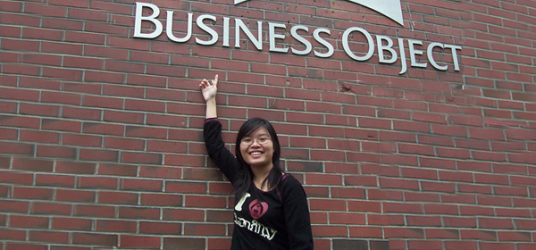
When Jeannie Chan graduated this June, she received a Bachelor of Science degree for her double major in Computing Science and Statistics, including a Co-op designation for to her five work terms. Looking back, she feels glad to have participated in the Co-op program, as it has enabled her to become more marketable and experienced as she moves forward in her career path.
In her Co-op experience, Jeannie spent her first two work terms at Business Objects, and her final three at IBMs Burnaby location. As a Computing Science and Statistics student, she was able to apply her classroom knowledge to her Co-op experiences at both companies. At Business Objects, Jeannie worked as a software engineer for the Localization (Translation) Team. I created internal tools to parse and convert source code to an XML format for translators to translate and vice versa, she explains. She also fixed translation bugs and updated existing technology to fit current needs, to name a few of her tasks. Aside from the skills she acquired throughout her work term, Jeannie really enjoyed the multicultural working environment at Business Objects, and the delicious snacks associated with it!
At IBM, Jeannie was a software developer/quality analyst. My tasks ranged from creating automation script for data entry to analyzing user cases for test cases and testing application, Jeannie explains. In addition to this, Jeannie gained a substantial amount of knowledge related to the health care industry, as she also worked on a health surveillance project. Because she predominantly worked with a laptop, her work hours and location were quite flexible. She was also able to acquire a range of soft skills, such as effective communication with her clients and successful project management. Also, she adds, on each co-op students birthday, the [Co-op supervisors] spent hours to decorate the birthday boy/girls cubicle and give them a surprise!
When asked what the most valuable benefit of participating in the Co-op program was, Jeannie states the importance of the connections she made with the companies in her field of study, along with the experience gained from working in a real-life, professional environment.
Jeannie had many great memories not only from her work terms, but also from her life as an SFU student! On her first day on campus, she joined the executive team of SFUs Chinese Link student club, and became a director for the Graphics Department. I had so much fun working with executives, preparing many different events for our members, not to mention that I got to try activities that I have never thought of trying (such as Famine 30, Rafting trip, archery, etc.). The opportunity allowed for Jeannie to gain leadership and teamwork skills, along with many new friends.
After her last semester of school, Jeannie took a well-deserved vacation to the Caribbean to unwind under the hot sun. She has just started in a full-time position at MacDonald, Dettwiler and Associates Ltd. Most of the employers asked about my Co-op experience as well as my role in student clubs, she says. I decided that MDA is a company that I can grow and develop my career with. While she is focusing on her new job for now, Jeannie plans to take part-time certificate courses to broaden her technical skills, and is thinking about pursuing a masters degree in the near future.
When asked if she would recommend the Co-op program, Jeannies answer was a definite yes. Other students should know about how Co-op can give them a preview of what their future career path is like as well as how many opportunities [there are] for them to start paving their path for landing an ideal job after graduation.














